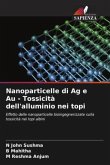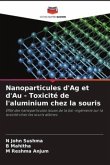Nanotechnology has made a significant impact on clinical therapeutics in the last few decades. The nanomedicine approach uses targeted nanoparticles as platforms to design imaging probes, as therapeutic agents for cancer and other human disorders. Synthesis of noble metal nanoparticles such as silver, gold, platinum, and palladium using plants or plant extracts have been suggested as possible eco-friendly alternatives to chemical and physical methods. Among the contaminants, Aluminum (Al) is one of the white silvery metals, abundantly distributed in the environment. Bacopa monniera (Bm) is one of the miracle herbs commonly grown in marshy areas throughout India. In traditional Ayurvedic medicine, it is used for the treatment of ulcers, tumors, enlarged spleen, indigestion, inflammation, leprosy, anemia, epilepsy, and asthma. Hence, the authors made an attempt to synthesize silver and gold nanoparticles by using Bacopa monniera. The structural, morphological, antimicrobial, in vitro antioxidant activities of synthesized nanoparticles have been carried out and also the effect of these nanoparticles against aluminum-induced toxicity has been studied in albino mice.








